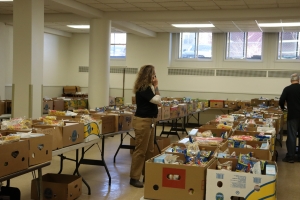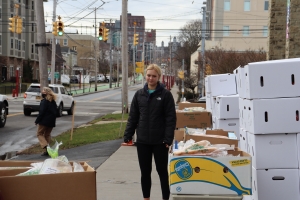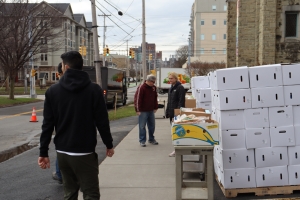news article
How University UMC is tackling the food insecurity crisis in Syracuse
March 30, 2022 / By Shannon Hodson / .(JavaScript must be enabled to view this email address)
Syracuse has the highest poverty rate in the country among cities with at least 100,000 residents, and almost half of all children in Syracuse are living in poverty. This makes food security essential in the city of Syracuse. Further complicating the need, the COVID-19 pandemic hit those already in poverty, the hardest.
In this environment, University UMC saw the need and enhanced their existing ministry to make an even greater difference. University UMC has had a food ministry, now known as The Food Center at 324 University Ave., for over 40 years. Prior to the pandemic, the church was feeding 50 families a week. Every Friday, they distributed whole grains, fresh produce, and meat (all provided by the Central NY Foodbank) to the city’s Southeast side residents.
Not long after the pandemic started, Grace Episcopal UMC, a church a block away from University UMC, merged its pantry with University’s pantry. Soon thereafter, Temple Concord, a nearby church that was closing, merged its food pantry with University’s. The volunteers from the other two churches became par
Barbara Slater and Shirley Edge were both volunteers at Grace Episcopal Church’s food pantry.
Speaking of the merger, Shirley said, “That was a hard decision because Grace has had a pantry since the early 70s.”
Barbara added, “When the pandemic happened, we merged with the Food Center here at University, so our volunteers came here, and we all work together….it also worked out better for our clients at McCarthy Manor (low income housing).”
Despite the New York workforce reduction executive order that was prompted by the pandemic, volunteers at food pantries were considered “essential workers.”
University’s food distribution moved from an indoor pickup to an outside drive-through and walk-through.
The pantry began serving 350 families a week at the height of the pandemic and this emergency food distribution became available to all residents in the city of Syracuse. The Food Center at 324 was designated as the USDA’s food pantry site for the City of Syracuse.
In recent months, the Food Center at 324 has been feeding about 200 families a week, also providing, diapers, hygiene needs, clothing, and pet food to those who need these items.
Galyn Murphy-Stanley, the Neighborhood Outreach and Food Center Coordinator said, “We were blessed to gain so many volunteers.”
On a recent Friday morning, Galyn spread her arms out wide to showcase the hundreds of boxes filled with goods like pasta, rice, nuts and dried fruit, cereal, and peanut butter, to be combined with fresh produce, dairy and meat before the clients arrive.
She said, “I have an army of over 200 volunteers that make this possible,”
Of those 200 volunteers, less than 10 are members of University UMC. The volunteer crew has grown mostly from word of mouth, but also, has grown with the help of students from nearby Syracuse University, Upstate Medical University, and SUNY ESF.
Lanny Freshman, an energetic man his 60s, greets volunteers and those picking up food, with a larger-than-life attitude and an infectious smile. He started volunteering with the Food Center about a year ago. He oversees the distribution of the food to the cars and walkers lining up in front of the church. Many students volunteer with Lanny.
Lanny said, “We get students pretty frequently. Volunteering is part of many programs at the universities. The kids volunteer and then tell their friends. People get a kick out of this; it’s fun! What’s cool is that these students are from all over the world. We have a young man from Peru, a number of students from China, and students from several different states. A lot of the students speak different languages and that helps with some of the customers who only speak limited English.”
Galyn explained, “Food is not the main story—yes the food is life-promoting, but this is more about these hungry individuals feeling welcome and safe.”
She continued, “What we need to recognize is that when people are feed well, it is emotionally and spiritually fulfilling, so they keep
The Rev. Alicia Wood, the pastor at University UMC nodded her head in agreement with Galyn, “Instead of qualifying who gets the food, we are here to strip down barriers to food access. Some pantries require you to prove that you are poor, how sad is that? Our ministry is hospitable to anyone who needs the food.”
“We want people to feel God’s love and know that they can feel this love without even stepping into a church.” Rev. Wood continued.
University UMC has excelled at living out the vision of the Upper New York Conference, “to live the Gospel of Jesus Christ and be God’s love with our neighbors in all places.”
Through University’s food pantry, they have reached hundreds of families throughout Syracuse—women, men, and children who tell their stories to the volunteers.
Rev. Wood described this experience, “We are building relationships. This feels like a home to them. They feel comfortable telling us about their experiences, and we always take time for them; we always listen.”
Relationships are being built with the volunteers as well.
Galyn said, “We are like a family. I consider these people my siblings.”
With so many young people volunteering at University, eager to help resolve the inequity of food distribution that they are learning about at school, Rev. Wood hopes that one day, there will no longer be a need for the food pantry.
She said, “Our whole goal in this is to put ourselves out of business so that everyone is fed healthy food equitably.”
